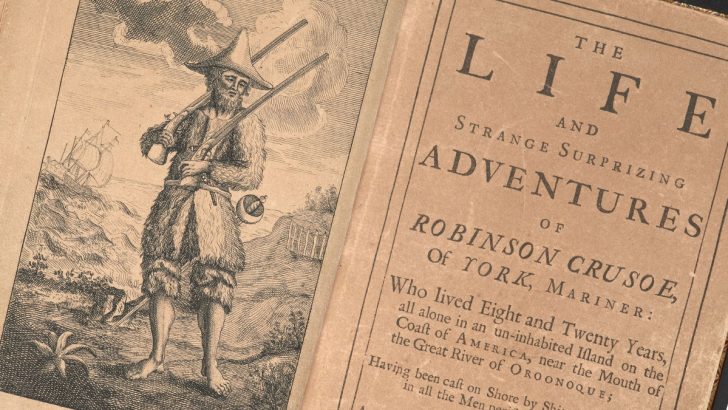by the Books Editor
When they were in doubt about a book to give a child or young person, our parents, grandparents and great grandparents gave a classic and in doing so followed an important tradition. But it is one with for some people disconcerting results.
The philosopher L.P. Jacks, the once eminent editor of the Hibbert Journal, devoted to philosophy and religion – a Victorian who lived down to 1955 – was a man very sensitive to the past and to the formative influence of books on growing minds and imaginations, as he wrote:
“The critical moment in my history may be assigned to a certain date in March 1868, when my father, according to an entry in his journal, bought me a copy of Robinson Crusoe for four-and-six. Little did my father dream what he was doing. As he walked home that night my Destiny was in his pocket.”
Imaginative child
“A book absorbed by an imaginative child can give a lifelong climate to the soul, lending its colours to the experience of the coming years, tempering the quality of moods, laying all values under debt to its influence. The atmosphere of the author’s mind, which critics may never discover, is the first element the child appropriates, becoming thereby a visionary on his own account. In reading the letter he catches the spirit rather than the meaning, the sense rather than the idea; he pierces to the secret springs of imagery; he sees, hears, touches, tastes; and so, following the innermost impulse of the written word, his own imagination becomes creative, and a new world is woven out of the living tissue of his sympathies…
“Had the eye of my father chanced upon some other book, all would have been different…then the lady who is now my wife would have belonged to another; my present children would not have been born, my strange life would not have been lived; and these lines would not have been written.
“Robinson Crusoe was the first book I read; nor have I ever read another with faith so complete, with imagination so on fire.”
“The sources of thought were tapped; the waters of fancy were unsealed, and the channel cut in which they are doomed to flow until they are lost for ever in the sea.”
“Like a stone dropped into the mouth of a geyser, the reading of that book let loose the floods that boil around the central fires; and a way was made for spirits that haunt the secret springs of life to come and go from that day to this.”
So it was too for Graham Greene from a Catholic point of view, as he writes in his, The Lost Childhood:
“Perhaps it is only in childhood that books have any deep influence on our lives. In later life we admire, we are entertained, we may modify some views we already hold, but we are more likely to find in books merely a confirmation of what is in our minds already: as in a love affair it is our own features that we see reflected flatteringly back.
“But in childhood all books are books of divination, telling us about the future, and like the fortune teller who sees a long journey in the cards or death by water they influence the future. What do we ever get nowadays from reading to equal the excitement and the revelation in those first 14 years?”
Learned
He explains that the moment he learned to read by himself he kept it a secret. “I suppose I half consciously realised even then that this was the dangerous moment. I was safe so long as I could read – the wheels had not begun to turn, but now the future stood around on bookshelves everywhere waiting for the child to choose…”
He went on to read many books, but especially King Solomon’s Mines, with the witch Gagool…
Remained
“Yes, Gagool has remained a permanent part of the imagination, but Quatermain and Curtis – weren’t they, even when I was only ten years old, a little too good to be true?…A child, after all, knows most of the game – it is only an attitude to it that he lacks. He is quite well aware of cowardice, shame, deception, disappointment…These men were like Platonic ideas: they were not life as one had already begun to know it.
“But when – perhaps I was 14 by that time – I took Miss Marjorie Bowen’s The Viper of Milan from the library shelf, the future for better or worse really struck. From that moment I began to write. All the other possible futures slid away: the potential civil servant, the don, the clerk had to look for other incarnations…
“Man is never satisfied, and often I have wished that my hand had not moved further than King Solomon›s Mines, and that the future I had taken down from the nursery shelf had been a district office in Sierra Leone and 12 tours of malarial duty and a finishing dose of blackwater fever when the danger of retirement approached.
“What is the good of wishing? The books are always there, the moment of crisis waits, and now our children in their turn are taking down the future and opening the pages. In his poem ‘Germinal’ George Russell (A.E.) wrote:
In ancient shadows and twilights
Where childhood had strayed,
The world’s great sorrows were born
And its heroes were made.
In the lost boyhood of Judas
Christ was betrayed.”
The passage by Dr L.P. Jacks comes from Among the Idol Makers (1911). The passage by Graham Greene is from his essay ‘The lost childhood’, which can be found in his Collected Essays (1969).


 Peter Costello
Peter Costello
